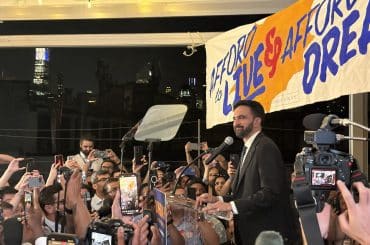Ratner is a friend (and a friend of this site) who gave me one of the touchstones for my progress when he told me years ago that his friend the painter Leon Golub had said to him, What does it mean to be a Jewish progressive artist? It means you don’t talk about Israel. I accepted that disclosure as a painful secret, and an oath to be undone; but the beauty of this interview is that there are no secrets. Having traveled a long road of awareness on the Israel issue, Ratner feels that sharing his story of Zionist community will help us all.
Watch the interview for yourself, but here’s a pointed summary.
Ratner grew up the son of immigrants in a big Cleveland family. His parents spoke Yiddish till he was four or five. His identity was formed by strong Jewish family: “partly security against being different from the other people around us– an immigrant family.” And Zionism was part of the family culture.
“My family, it was just assumed, Israel is a good thing, we have to support it…. You never heard a word about Palestinians, not a word.”
His community exposed him to unrelenting propaganda for Israel, and Ratner bought it. “I stayed home from school to finish [Exodus] because it was such a good book… Israel was pushed and pushed, and not just by Jewish people.”
Even then there were Jews who questioned Zionism. Not ones he knew. “There were Jews who felt, this is not a good idea… This is going to hurt Jews, in the world.”
He first went to Israel in 1956, his bar mitzvah year, and saw a beautiful country.
“All the places I thought that my actual ancestors walked on. I came back really romantically in love with the place…. I even painted a map of Israel on my room… That was not completely unusual for people of my generation.”
On a visit in 1961, his family visited the Prime Minister’s office and saw a huge map of Israel on the wall, and Israel as a blue dot in a sea of brown. The message: “We are a beleaguered country… That’s why we need support.” Though today he understands that message as: Israel is “an outpost, a western settler colony that will only face toward Europe.”
Jay asks how did he get to that awareness? Only with great difficulty.
Ratner felt misgivings after the Six Day War. “It didn’t seem right to me that they needed the entire West Bank for their defense… It was an intellectual feeling that this is wrong… That they’re occupiers. But emotionally I couldn’t break with my attachment.”
His confusion disabled him from speaking out about the conflict. He understood that what Israel was doing was wrong, as a settler imperialist country. But his emotions were still so tied to “this is the land of my people” and concerns about the Holocaust and his many relatives in Israel.
It took Vietnam and the US role in the world to help Ratner wake up: observing US immorality led him to question Israel’s role as an American client state. Still he didn’t feel that he “knew enough” (the old literacy test) till the 1980s. He only began to speak out “quite late,” he says. And even today in New York people feel strong inhibitions about speaking out.
Ratner cites two factors that allowed to speak out. They are both so important that I need to emphasize them.
First, “Getting to know Palestinians was probably very important on that adventure.” Amen.
Second, he needed others. They granted him “freedom,” he says, “because I had a community that would protect me. It wasn’t just me going out there.”
That’s a reminder of what social beings we all are. Even the most independent-thinking individuals lean on others.
When did he really let go? It was in 2010, and Ratner couldn’t get into Gaza for the Freedom March and he flew on to Israel and then the West Bank.
“That was astonishing. If you ever want to talk to anybody about Palestine and Israel, send them to Hebron. And see one of the most discriminatory outrageous treatments of human beings that you will ever see.” A thriving Palestinian city with a colony of Jews inside, protected by Israeli forces.
“I think going to Hebron was the final moment,” Ratner says. “I don’t think there’s any rational argument to make for what Israel has done not only in the occupied territories but also in Israel itself.”
So he began to write about it and speak out in a new way.
And his family?
“My family is very varied. I have a huge family…It varies like any community varies. You have people who have a heavy belief in a state of Israel, in a Jewish state of Israel. And then you have people in the middle, who believe that the occupation is just outrageous, but Israel itself should be able to be there… Then you have people, fewer, like me, that ultimately believe in a one state solution, that there should be equal citizenship for every single person there…. Like any family, particularly Jewish families, it varies along a wide spectrum. I would be certainly on the far end of that spectrum.”
Honest, moving, and a model for all who struggle with identity politics.
(I have one minor challenge. Ratner’s doorway to a critique of Israel was anti-imperial engagement; seeing immoral U.S. conduct enabled him to regard Israel in the same light, and overcome the Jewish community’s prohibition against criticism of Israel. I wonder, to what extent was a critique of US conduct part of the Jewish experience of the older generation among whom Ratner and I grew up. I.e., Chomsky’s father fled military service under the czar in Russia, and knowledge that the czar was a bastard fed my mother’s opposition to the Vietnam war, and maybe Chomsky’s too. But what if your American experience is actually less oppositional than the frame carried over from eastern Europe? If this society granted you enormous freedom and proved philosemitic? Well then you are more open to the Israel lobby theory, and the idea that the Iraq war and support for Israeli occupation flow not from imperial ambition but from neoconservative hubris.)
Disclosure: This article contains references to Michael Ratner, and quotations from Ratner, who was a supporter of our website at the time the article was published.


Good riddance to Michael and Phil in America, where the steady decline of Judaism goes on unabated.
Great interview. I recommend viewing the 1st part, too. I have not yet viewed the rest but I will soon.
Aren’t they the same? The main difference is that neoconservatism has Zionism, an ethnic and tribal underpinning, at its core. While American imperialism is more about political power. But this isn’t necessarily spelled out in your question, and it suggests, in your assumptions.
One of the most interesting things he says in the interview is that by 1967, he started to understand intellectually where Israel was headed. He had previously been taken in with romanticism, as his first contact with the country was for a few months when he was 13, and you could say it was Birthright before the term was invented.
Yet at the same time, he explains, he couldn’t separate himself emotionally and he calls this being “disabled from speaking about Israel”. I think he’s correct when he says a lot of Jews are like this, especially older Jews.
This also explains the state of the Jewish debate surrounding Israel within our community, which is characterized by silence and censorship more than anything else.
Phil – I don’t get why it’s so hard for you to understand: it’s not an either/or scenario between “Imperial Ambition” and “Neoconservative hubris” – it’s dialectic.
Also, you’re really in no position to challenge Ratner – he evolved long before you did, and, let’s put it this way – he’d have tossed out his sodastream maker without a second thought, Rabbi and mom be damned.
“Ratner felt misgivings after the Six Day War. “It didn’t seem right to me that they needed the entire West Bank for their defense… It was an intellectual feeling that this is wrong… That they’re occupiers. But emotionally I couldn’t break with my attachment.””
Frank felt misgivings after the children were abused. It didn’t seem right to do that to a baby. It was an intellectual feeling that this is wrong..they are child abusers. But emotionally they were my people. I couldn’t let them down.